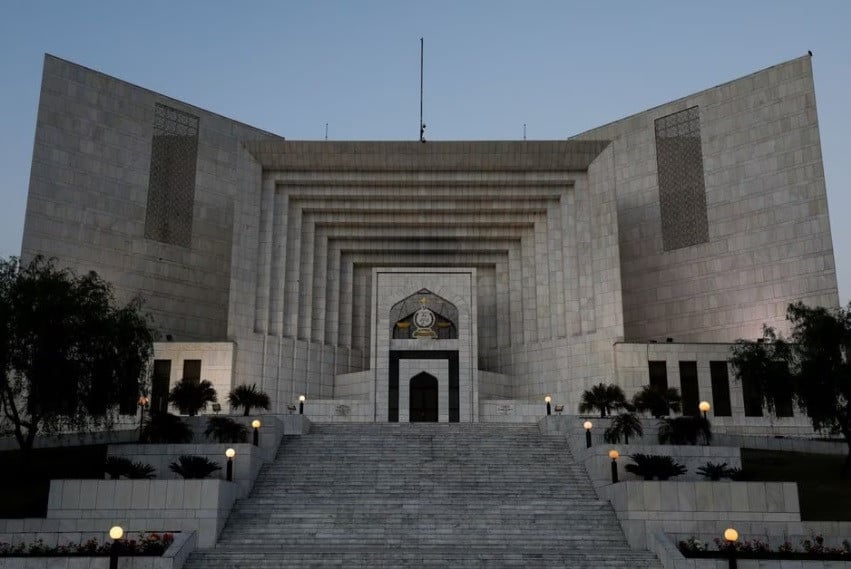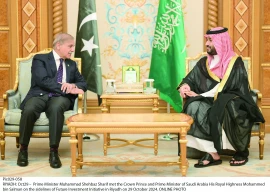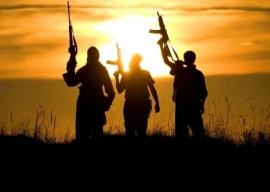
The Supreme Court is expected to conclude its proceedings on a presidential reference seeking a review of the SC’s 1979 verdict in the Zulfikar Ali Bhutto case by next Monday.
A nine-member larger bench, led by Chief Justice of Pakistan (CJ) Qazi Faez Isa, resumed hearing the reference on Wednesday and deliberated on various aspects of the Bhutto case for over six hours.
The Lahore High Court (LHC) had sentenced former prime minister Bhutto to death on March 18, 1978, for ordering the assassination of Ahmed Reza Kasuri, one of the founding members of the PPP.
The Supreme Court, with a majority vote of 4 to 3, upheld the LHC verdict on February 6, 1979. The PPP founder was executed on April 4 of the same year.
During the PPP’s last rule between 2008 and 2013, former president Asif Ali Zardari sent the reference to the apex court, requesting an opinion after analyzing the SC’s and the LHC judgments in the ZAB case based on the fundamental rights guaranteed under the Constitution.
During Wednesday's proceedings, one of the court’s amici, former judge Manzoor Ahmed Malik, informed the court that the approver in the case, Masood Mahmood, had testified that Bhutto ordered him to murder Kasuri.
“The statement of the second witness was ignored because it contradicted the claim made by the approver, Masood Mahmood,” he said.
CJ Isa asked for the pardon notification for the approver.
“Mahmood also belongs to Kasur district. Did the person who ordered the murder not know that Masood and Ahmed Raza Kasuri both hail from the same area? Did the Supreme Court and the High Court assess this aspect?”
The judge noted that people from the same area often develop differences and even enmity.
“Have investigations been conducted into this aspect to determine if someone else gave the order for Kasuri’s murder and blamed the former prime minister for it? Why did the witness’s conscience awaken after three years?" he questioned.
The court ordered Attorney-General for Pakistan (AGP) Mansoor Awan to provide details about relocating the approver to a foreign country.
The counsel for Bhutto’s grandchildren, Fatima Bhutto and Zulfikar Ali Bhutto Junior, noted that Justice Nasim Hasan Shah, one of the SC judges who had convicted Bhutto, later admitted that the judiciary was helpless during the martial law.
"This is a general statement. Will it apply to all of his decisions?” Justice Yahya Afridi asked.
Justice Sardar Tariq Masood asked, "Will we reopen all cases from the martial law era?" Many cases, including the Wali Khan case, have reached the Supreme Court since. If we open the floodgates once, there will be an inundation of cases,” he said.
The CJ remarked that Justice Nasim Hasan Shah's statement is not related to the Bhutto case verdict. The court's duty is only to answer the questions raised in the presidential reference, he said.
Justice Mansoor Ali Shah said there is a need to first clarify which legal question is raised in the reference, adding that the Supreme Court cannot make amendments to the presidential reference.
“The legal question should be whether there was bias in the judges. Our response will then be based on that. Another legal question could be whether there was pressure on judges during the trial.
“The court does not feel ashamed to rectify its mistake, but please provide the procedure. It is still not clear what legal question has been raised in the reference,” he said.
The CJ remarked that some new questions have arisen during the hearing. “Could the investigation be reopened? Could the LHC directly hear the trial? These are the questions that need to be examined.”
When court assistant Aitzaz Ahsan cited institutional bias as the reason, Justice Yahya Afridi responded that three judges of the Supreme Court had dissented from the decision to hang Bhutto, so the argument of institutional bias was not correct.
Justice Jamal Khan Mandokhail added that two judges of the LHC had granted bail to Bhutto, and the judge who was removed by Bhutto and was reinstated by General Ziaul Haq had opposed Bhutto's hanging.
The court later directed all parties to complete their arguments by the next hearing, noting that no further time would be given to any party. The court then adjourned till Monday.
1719660634-1/BeFunky-collage-nicole-(1)1719660634-1-405x300.webp)

1732276540-0/kim-(10)1732276540-0-165x106.webp)

1732274008-0/Ariana-Grande-and-Kristin-Chenoweth-(1)1732274008-0-165x106.webp)


1724249382-0/Untitled-(640-x-480-px)1724249382-0-270x192.webp)


1732270499-0/Express-Tribune-(7)1732270499-0-270x192.webp)






COMMENTS
Comments are moderated and generally will be posted if they are on-topic and not abusive.
For more information, please see our Comments FAQ